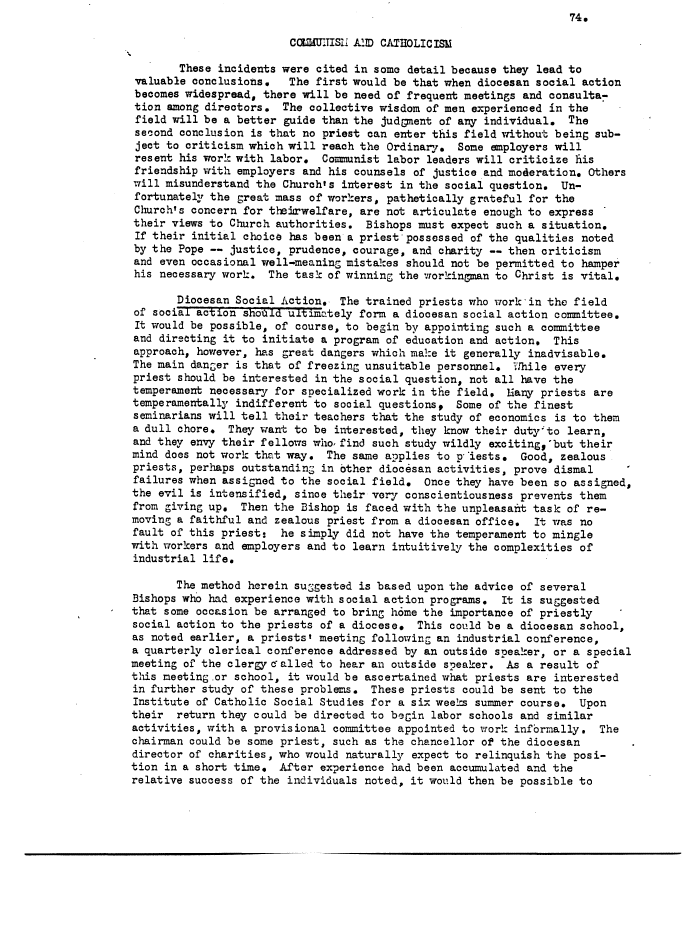 |
||||
 |
||||
| 74. CCfcSflJITISii AID CATHOLICISM * These incidents were cited in some detail because they lead to valuable conclusions. The first would be that when diocesan social action becomes widespread, there will be need of frequent meetings and consulta- tion among directors. The collective wisdom of men experienced in the field 7ri.ll be a better guide than the judgment of any individual. The second conclusion is that no priest can enter this field without being sub- ject to criticism which will reach the Ordinary. Some employers will resent his work with labor. Communist labor leaders will criticize his friendship with employers and his counsels of justice and moderation. Others vrill misunderstand the Church's interest in the social question. Un- fortunately the great mass of workers, pathetically grateful for the Church's concern for theirwelfare, are not articulate enough to express their views to Church authorities. Bishops must expect such a situation. If their initial choice has been a priest possessed of the qualities noted by the Pope — justice, prudence, courage, and charity — then criticism and even occasional well-meaning mistakes should not be permitted to hamper his necessary work. The task of winning the workingman to Christ is vital. Diocesan Social Action. The trained priests who work'in the field of social action should ultimately form a diocesan social action committee. It would be possible, of course, to begin by appointing such a committee and directing it to initiate a program of education and action. This approach, however, has great dangers which make it generally inadvisable. The main danger is that of freezing unsuitable personnel. V/hile every priest should be interested in the social question, not all have the temperament necessary for specialized work in the field. Many priests are temperamentally indifferent to social questions, Some of the finest seminarians will tell their teachers that the study of economics is to them a dull chore. They want to be interested, they know their duty'to learn, and they envy their fellows who/find such study wildly exciting,'but their mind does not work that way. The same applies to p-'iests. Good, zealous priests, perhaps outstanding in other diocesan activities, prove dismal failures when assigned to the social field. Once they have been so assigned, the evil is intensified, since their very conscientiousness prevents them from giving up. Then the Bishop is faced with the unpleasant task of re- moving a faithful and zealous priest from a diocesan office. It was no fault of this priest• he simply did not have the temperament to mingle with workers and employers and to learn intuitively the complexities of industrial life. The method herein suggested is based upon the advice of several Bishops who had experience with social action programs. It is suggested that some occasion be arranged to bring home the importance of priestly social action to the priests of a diocese. This could be a diocesan school, as noted earlier, a priests' meeting following an industrial conference, a quarterly clerical conference addressed by an outside speaker, or a special meeting of the clergy c'ailed to hear an outside speaker. As a result of this meeting .or school, it would be ascertained what priests are interested in further study of these problems. These priests could be sent to the Institute of Catholic Social Studies for a six weeks summer course. Upon their return they could be directed to begin labor schools and similar activities, with a provisional committee appointed to work informally. The chairman could be some priest, such as the chancellor of the diocesan director of charities, who would naturally expect to relinquish the posi- tion in a short time. After experience had been accumulated and the relative success of the individuals noted, it would then be possible to |